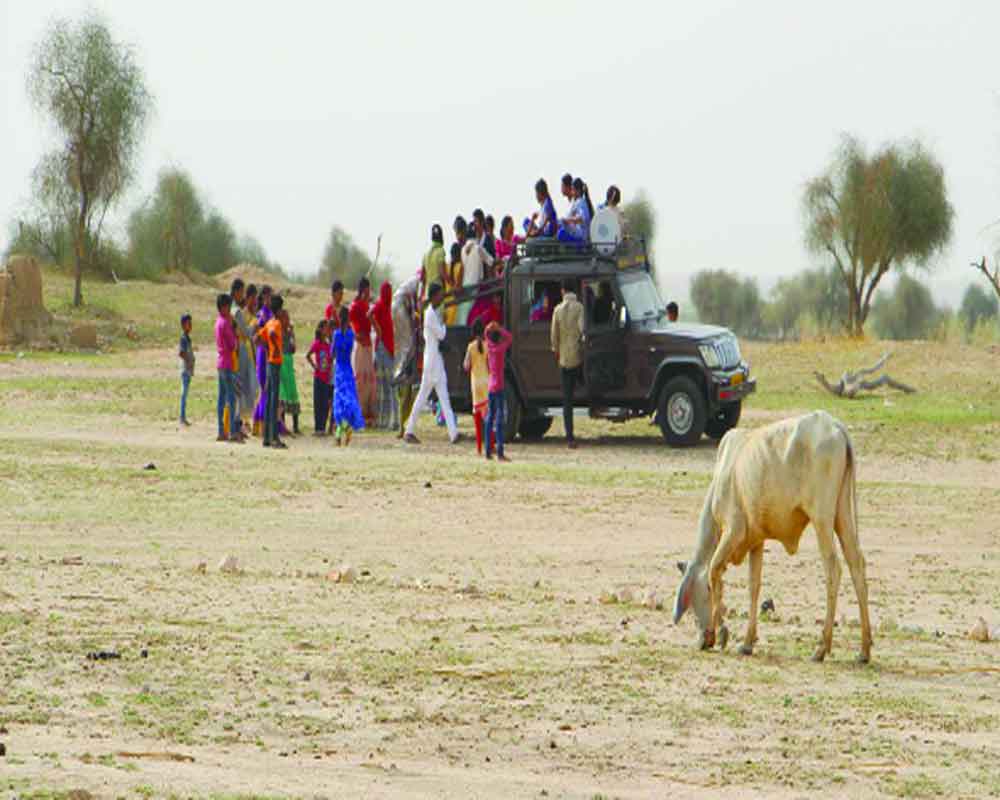Deteriorating roads in Bhopalaram village of Bikaner hinder development, affecting health, education and mobility
Development in Bhopalaram village, situated in the Lunkaransar block of Bikaner, Rajasthan, has come to a halt due to the lack of proper roads. The absence of a paved road is a significant challenge for the nearly two thousand residents in the village. According to 47-year-old resident Baluram Jat, the main road connecting the village to the block headquarters was constructed around eight years ago and has not been maintained since, rendering it impassable.
The road's deteriorated condition has made it challenging even for families to transport patients to the hospital. During Vimla's childbirth, the ambulance broke down due to the damaged road, forcing the family to arrange a private vehicle to reach the hospital. Vimla, a 28-year-old young woman from the village, noted that her condition worsened due to the road's large potholes. She highlighted that many pregnant women in the village prefer going to their parental homes for childbirth due to these challenges. However, for those unable to do so, the journey to the hospital becomes exceedingly difficult.
The challenging road conditions in the village have significantly impacted the lives of individuals with disabilities as well. Rajaram, a 26-year-old affected by polio in both legs, shared that although the government provided him with a hand-operated bicycle, the deteriorating state of the roads poses a considerable obstacle to his mobility. The uneven and damaged surfaces make it challenging for Rajaram to use his bicycle effectively for travel, exacerbating the difficulties he faces due to his disability.
The advancement of development is hindered by deteriorating roads. When the road conditions are subpar in a given area, the progress in other sectors is inevitably hampered. In Bhopalaram village, Vinod, another resident, points out that the deteriorating road has led to a severe water problem. Water tankers from the block have to navigate the broken road, causing more than half the water to spill before reaching the village. This not only leads to water wastage but also compels villagers to incur additional expenses to procure water once more.
The deteriorated road has had a detrimental impact on the education of village girls as well. Seventeen-year-old Malati reveals that she had to halt her education after completing 10th grade because she faced challenges travelling eight kilometres to reach the Higher Secondary School in Lunkaransar Block for her 12th-grade studies. The poor condition of the road resulted in limited transportation options from the village, and her parents couldn't afford to purchase a scooter for her. Malati also highlights that although some portions of the road have been patched with bricks, persistent difficulties will persist until the entire road is improved.
In this regard, the Chairman of the Gram Seva Sahakarita Samiti, Asuram, explains that a space of 50 feet was allocated for this road, but it was constructed only within 20 feet. Due to its small and deteriorated condition, villagers face daily challenges. If there is any hindrance in tendering for the construction of this road, it can also be done under the Mahatma Gandhi National Rural Employment Guarantee Act (MGNREGA). This would not only improve the condition of the road but also provide employment to people under MGNREGA. Asuram asserts that the village's most crucial need should be promptly fulfilled through the Panchayati Raj Institutions because the road is not just a means of transportation but plays a significant role in opening new avenues for development. It is not only a means of access but is also intricately connected to education, health, and the economy.
(Tamanna is a student of Class 12 from Lunkaransar, Rajasthan. Views are personal. Charkha Features)


























